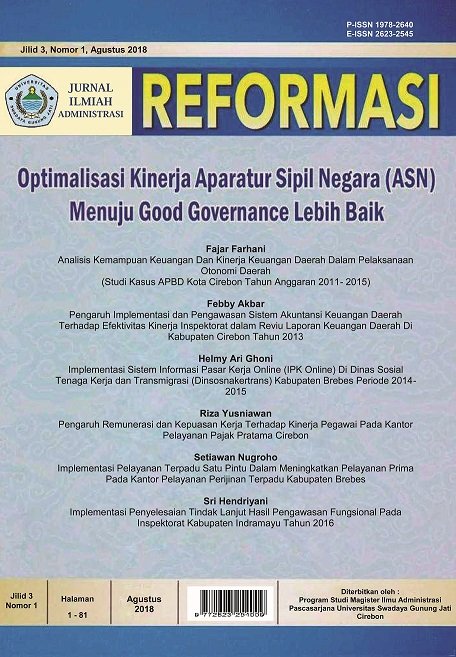Implementasi Penyelesaian Tindak Lanjut Hasil Pengawasan Fungsional Pada Inspektorat Kabupaten Indramayu Tahun 2016
DOI:
https://doi.org/10.33603/.v3i1.1793Abstrak
Supervision is not just a mere supervision, especially if it's just to find fault. Supervision starts from planning, implementing, reporting and finally follow up from the results of supervision. This research was conducted to analyze the Follow-up of Supervision Results conducted by the Regional Inspectorate of Indramayu Regency. Follow-up to Supervision Results are reviewed from the APIP policy aspects of the implementation of completion of Oversight Results Follow-up, audited responses to audit findings, causes of audit findings, audited responses to delays in Follow-up Monitoring Results. More in this study wants to examine the steps of policy makers in completing the findings of the Audit Results Report.
The Examination Result Report contains findings, conditions, causes, consequences and recommendations for recommendations that must be followed up by the Regional Work Unit (SKPD) which is examined to correct errors in the implementation of the administration of the general government and government implementation affairs that occur in the SKPD examined. The follow-up itself aims to improve and improve the quality of good and clean governance
Factors that cause low or not yet achieved completion of follow-up include lack of leadership commitment or change of leadership in the work unit / work unit, so that new leaders are less concerned about the follow-up of the results of supervision because they feel it is not their responsibility. The cause of the findings (disobedience to the legislation and the weakness of the internal control system) and the delay in following up on the findings of the examination include internal factors and external factors. Internal factors include leadership and subordinate human resources, lack of subordinate human resource capabilities and leadership managerial abilities. An external factor is the third party's lack of discipline regarding the findings of the examination and the existence of social problems in the community.
In order to resolve the follow-up to the audit results, it is necessary to conduct direct monitoring efforts, namely by reviewing directly to the audited work unit / work unit accompanied by a value test of the findings of the audit completed with the Follow-Up Update Minutes. While the indirect update is carried out based on a value test of supporting documents / evidence submitted by the work unit / work unit as a follow-up to the auditor's recommendations.Referensi
a. Buku-buku
Akmal, Pemeriksaan Intern (Internal Audit), Edisi Pertama, Jakarta, Indeks, 2007
Agustino, Leo, 2006. Dasar-Dasar Kebijakan Publik, Alfabeta. Bandung
Agus Suryanto, Studi Keterlambatan Tindak Lanjut Hasil Pemeriksaan Inspektorat Daerah Kabupaten Kulonprogo DI Yogyakarta dan Implementasi Manajerial
Budi Winarno (2014), Kebijakan Publik (Teori, Proses dan Studi Kasus), Central of Academic Publishing Service (CAPS)
Dunn, William, N, (2000) Pengantar Analisis Kebijakan Publik, Jogyakarta, Gajah Mada University Press
Edward, George C (2000) Implementing Public Policy, Washington Congressional Quarterly Press
Handayaningrat, S (2006) Pengantar Studi Ilmu Administrasi dan Manajemen, Jakarta, Gunung Agung
Hiro Tugiman. 1997. Standard Profesional Audit Internal. Kanisius. Yogyakarta.
Makmur (2015), Efektivitas Kebijakan Kelembagaan Pengawasan, PT.Refika Aditama
Siagian, SP (2007) Organisasi Kepemimpinan, Perilaku Administrasi, Jakarta, Gunung Agung
Suriansyah Murhaini, (2014) SH., MH, Manajemen Pengawasan Pemerintah Daerah, Pustaka Pelajar
Subarsono AG, (2010) Analisis Kebijakan Publik; Konsep Teori dan Aplikasi, Yogyakarta, Pustaka Pelajar
Sugiyono, (2015), Metode Penelitian Kuantitatif dan Kualitatif, dan R&D, Cv Alfabeta
Wahab, Solichin Abdul (2004) Analisis Kebijakan dari Formulasi ke Implementasi Kebijakan Negara, Jakarta Bumi Aksara
BPKP, (2007) Kendali Mutu, Edisi Kedua
BPKP, (2008), Kode Etik dan Standar Audit, Edisi Revisi Kelima
b. Peraturan Perundang – Undangan
Peraturan Pemerintah Republik Indonesia Nomor 8 Tahun 2008 tentang Tahapan, Tata Cara Penyusunan, Pengendalian dan Evaluasi Pelaksanaan Rencana Pembangunan Daerah
Peraturan Pemerintah Republik Indonesia Nomor 60 Tahun 2008 tentang Sistem Pengendalian Intern Pemerintah
Keputusan Presiden Nomor 74 Tahun 2001 tentang Tata Cara Pengawasan Penyelenggaraan Pemerintah Daerah
Peraturan Menteri Dalam Negeri Nomor 8 Tahun 2009 tentang Pedoman Tata Cara Pengawasan Atas Penyelenggaraan Pemerintah Daerah
Peraturan Menteri Dalam Negeri Nomor 47 Tahun 2009 tentang Pedoman Pengawasan Penyelenggaraan Pemerintah Daerah Tahun 2010
Peraturan Menteri Negara Pendayagunaan Aparatur Negara dan Reformasi Birokrasi Nomor 19 Tahun 2009 tentang Pedoman Kendali Mutu Audit
Peraturan Menteri Negara Pendayagunaan Aparatur Negara dan Reformasi Birokrasi Nomor 9 Tahun 2009 tentang Pedoman Umum Pelaksanaan, Pemantauan, Evaluasi dan Pelaporan Tindak Lanjut Hasil Pengawasan Fungsional
c. Tesis
Futri Rizqi Listya (2015), Implementasi Kebijakan Standar Audit Permenpan Nomor 5 Tahun 2008 dalam Upaya Mengoptimalkan Efisiensi pada Inspektorat Kabupaten Cirebon, Universitas Swadaya Gunung Jati
I Gusti Agung Ayu Kusuma Arini (2014), Analisis Peran Manajer dalam Tindak Lanjut Laporan Hasil Pemeriksaan oleh Satuan Pemeriksa Intern di RSUP Sanglah Denpasar Tahun 2012, Universitas Indonesia
Tri Hartono, (2006), Evaluasi Penyelesaian Tindak Lanjut Temuan Audit Sebagai Unsur Penilaian Kinerja Manajemen Kantor Cabang (Studi Kasus pada Bank BTN), Universitas Diponegoro
Unduhan
Diterbitkan
Terbitan
Bagian
Lisensi
The Authors submitting a manuscript do so on the understanding that if accepted for publication, copyright of the article shall be assigned to Jurnal REFORMASI, Sekolah Pascasarjana Ilmu Administrasi. Universitas Swadaya Gunung Jati as publisher of the journal. Copyright encompasses rights to reproduce and deliver the article in all form and media, including reprints, photographs, microfilms, and any other similar reproductions, as well as translations.Â
Jurnal REFORMASI, Universitas Swadaya Gunung Jati and the Editors make every effort to ensure that no wrong or misleading data, opinions or statements be published in the journal. In any way, the contents of the articles and advertisements published in Jurnal REFORMASI are the sole responsibility of their respective authors and advertisers.

